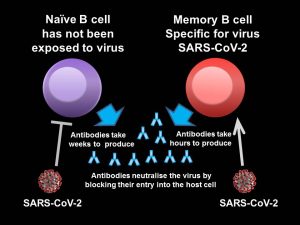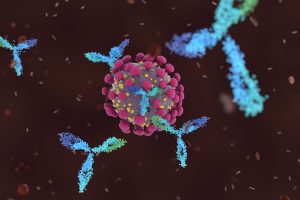29th October 2020 – Recent reports in the press about declining antibody levels in a large cohort of individuals in Britain has led to anxieties amongst ordinary people that a vaccine, when it eventually arrives, might not work to give lasting immunity. Here in this short blog we give reassurances that this is not necessarily the case.
A Blog by Dr David J Flavell PhD FRCPath & Dr Sopsamorn (Bee) Flavell BSc PhD
Scientific Directors of Leukaemia Busters
COVID-19: Is Immunity Really Waning?
29th October 2020
Recent reports in the press about declining antibody levels in a large cohort of individuals in Britain has led to anxieties amongst ordinary people that a vaccine, when it eventually arrives, might not work to give lasting immunity. Here in this short blog we give reassurances that this is not necessarily the case.
It is unfortunate that very recent reports in the press have suggested that immunity to the SARS-CoV-2 coronavirus, the cause of COVID-19 might be short lived. This follows from a very large study by researchers at Imperial College, London, of antibody levels measured in 365,000 individuals in Britain. To counter this a very recent American study from Mount Sinai Hospital in New York reports that antibody levels in Coronavirus patients are maintained for at least five months after infection. So who do we believe?
The Imperial College report has unnecessarily led to consternation and anxieties amongst ordinary people who do not always have the background knowledge to interpret what the results might actually mean.
This short blog is intended to redress this to put people’s minds more at ease whilst still keeping a realistic view on what these data actually mean for the success of a future vaccine. For those interested, further details on the Imperial College managed REACT-2 study led by Professor Paul Elliott can be found on their website by clicking on the link above.

The first thing to say is that antibody levels that decline in people previously exposed to the COVID-19 coronavirus does not necessarily mean that they are losing their immunity. There are immune cells called B-cell and T-cell memory cells that are far more important to long-term immunity; we’ll come back to these in a minute.
We can also take some comfort in the fact that only a handful of “re-infections” have been reported since the beginning of the pandemic, an observation indicating that the vast majority of previously infected individuals are immune otherwise there would be large numbers of re-infections and there aren’t.

Y-shaped antibodies produced by white blood cells called B-lymphocytes attach to the coronavirus thus neutralising it and rendering it non-infectious in the body
But firstly let’s consider what antibodies are, what they do and how they work. Antibodies are large highly specialised proteins produced by a type of white blood cell called a B-lymphocyte. They are not living entities and work by neutralising the virus when they firmly attach to its spike (and other) protein(s) on the surface of the viruses thus blocking it from entering and infecting cells in the respiratory tract.
The length of time which antibodies continue to circulate in the bloodstream of the immune individual is limited to a few weeks or months if the B-lymphocytes (that are living little antibody factories) stop making them.
This is absolutely normal for all antibodies and should not surprise us at all. What is important is to understand that it is the persistence of other living immune cells called memory B- and T-cells that are critical for establishing long lasting immunity.
These memory immune cells remember which microorganisms an individual has encountered in the past and they instantly react by producing a new batch of antibodies if they encounter the same microorganism in the future.
Memory B- and T-cells are long lived, some for just a few years others for a full lifetime. We do not currently know precisely how long anti-COVID-19 coronavirus immune memory cells live yet but based on previous experiences with other coronaviruses this is likely to be at least one to two years at least. The memory B- and T-cells sleep quietly in our blood stream and lymph nodes waiting to reawaken if they encounter a pathogen they have seen before.
When this happens they kick into action immediately with the memory B-cells producing new antibodies against the invading microorganism whilst the memory T-cells go on the attack against any respiratory cells that have become infected with virus, eliminating these before the virus has a chance to establish itself properly. This is known as the secondary immune response and is much quicker than the primary immune response that takes several days or weeks to develop on the first occasion that an individual encounters a microorganism for the first time.
As a result people who mount a secondary immune response against a pathogen they’ve seen previously are able to eliminate the infection before they even realise they’ve got it and therefore usually don’t develop any symptoms. That’s the truth behind our remarkable and wonderful immune system.
In a nutshell that’s why we feel that too much has been made of the Imperial College declining antibody study that we feel has been too negatively presented to the public by the press. All the published experimental research data that we have seen in recent weeks supports the view that memory B- and T-cells against the SARS-CoV-2 virus do persist and are ready to kick into action if this coronavirus shows its ugly face again and that’s why none of us should waste any sleep on worrying whether a vaccine will provide long term protective immunity or not.
Experience with other coronavirus infections such as SARS (2002) and MERS (2009) show that immunity persists for at least two years in the majority of cases and if that also turns out to be the case for COVID-19 then yearly or two yearly vaccination booster shots will be necessary to maintain immunity in the global population. What will be critical is the number of people who take up the vaccine when it eventually become available, probably sometime in 2021.
If sufficient numbers of people globally are vaccinated then there’s a good chance that the virus will be eliminated from the human population entirely, such as was eventually achieved for smallpox. But if a less than a critical number of people take up the vaccine then the virus will survive in a reservoir of non-vaccinated humans becoming endemic, circulating in the human population for years or even decades to come.

In these circumstances we shall have to be continually on our guard and expect the need for booster shots for those willing to be vaccinated every year or so. We think that the probability of there being a safe and effective vaccine is very high but ultimately the success of any effective vaccination programme against COVID-19 will depend on the take up rate and reaching that critical number of immunised individuals in society to achieve the desired herd immunity effect. That is why it is in everybody’s interest to make sure they are vaccinated just as soon as an effective and fully safety evaluated vaccine becomes available for the masses.
A Free High Spec Washable Face Mask for You!

We have obtained specific funding for a supply of high quality reusable/washable 4-ply face masks that we are offering to people in limited numbers for free. To claim your mask please follow the instructions given at the end of the blog entitled Mask Up!.
Note: None of Leukaemia Busters research funds have been used in the supply of these masks.
To read our other blogs click here.
For an up to date on our COVID-19 blog please follow us on Twitter:


